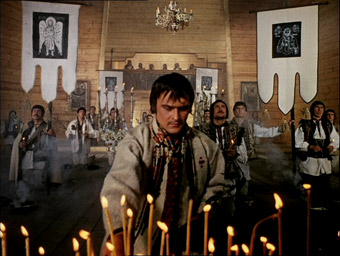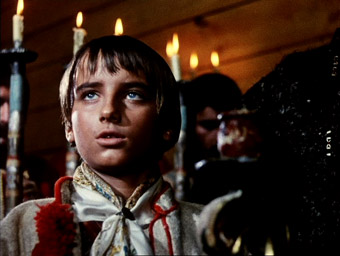|
You might reasonably expect the work of Sergei Parajanov – a man arrested numerous times by the Soviet Union – to be wilfully subversive. Slavering cinephiles will depress the spongy ► on their DVD remotes, anticipating a film that rails against the repressive legacy of Joseph Stalin. Shadows of Forgotten Ancestors was the work that first brought the ire of the Soviet machine down on Parajanov, but is in fact a very unpolitical film. Its radicalism is all cinematic, expressing the soul of an artist who was diametrically opposed to the predominant social realism of his time. What so enraged Parajanov's masters were the opulent colours and off-kilter style of Shadows; anathema to the Soviet aesthetic code.
Even for Parajanov, Shadows was a meaningful break from tradition. Adapted from the novel of the same name by Mykhailo Kotsiubynsky, Parajanov described all his previous work as "garbage" following its release. The film focusses on the Hutsul people of the Carpathian mountains, a predominantly Ukranian collective rarely captured on camera. We follow the undulating life of Ivan (Ivan Mikolajchuk), an ordinary man repeatedly wracked by love and loss. Through his twin belles, Marichka (Larisa Kadochnikova) and Palagna (Tatyana Bestayeva), Shadows constructs a beautiful collage of universal human experience, told against the backdrop of a fascinating sub-culture.

The film was made in the 1960s, but many of its core oddities remain unusual. Parajanov appears mindful of this and telegraphs Shadows' most prominent eccentricity within moments of the title card. This, he tells us, is a "poetic drama." Directors are famous for prattling on spuriously about the various complex features of their own work, but as the minutes tick by, it becomes obvious just how well that description fits the film. Early on, Ivan and Marichka, mining that rich tradition of star-crossed lovers, cavort through the woods, singing a stilted hymn to their relationship. This moment is just one example of the behavioural weirdness that characterises the entire picture. Rather than walking and talking like regular people, the actors move step-by-step through a choreographed allegory. When Ivan stumbles around a crowded tavern full of whooping patrons, he uses the building blocks of standard human behaviour to translate his torment. In this way, the film mirrors poetry, which uses words usually deployed in basic sentences to create beautiful concoctions that express something deeper. This kind of acting, one step removed from the ordinary, is a rare treat. It can sometimes be confusing, but frequently meshes expertly with the rest of Parajanov's cocktail.
Key to that mixture is a camera at odds with the filmmaking standard of the time. In a period where almost all directors kept their lenses firmly rooted to the ground, Parajanov flings his cameraman around to giddy effect. While the likes of Cloverfield use shaky-cam to imitate modern-day handhelds, Parajanov had no such commercial touchstone. At its most effective, the dynamic lens makes the viewer feel like a true voyeur, viewing the action from behind a bush or trudging through the snow at Ivan's side. For the most part this technique is masterfully handled, but occasionally Parajanov is unnecessarily contrary. In one scene, Ivan and his mother carry a ladder into their decaying wooden house, pivoting towards the camera as they move around a corner. The cameraman is deliberately position directly in the path of the ladder, so that, as it moves sideways, he must duck beneath it and spin in order to keep the lead character in view. Moments like this smack of excessive contrivance, but they are the dirty end of what is otherwise an effective and refreshing method.

While filmmaking style and acting method are central to the otherworldly quality of Shadows, the Hutsul people provide a healthy dose of oddness. I cannot tell you if those strange cavorting festivals are true to Hutsul tradition, but they have a wild alien quality. For example, when Ivan arrives for his own wedding, he and his bride are immediately blindfolded. They then have a strange wooden contraption fitted over their necks as craggy old ladies chant in the background. The film is littered with these kinds of fascinating episodes, that add even more spice to an already exciting work.
The music of the Hutsul people also plays a large part in the atmosphere of Shadows. The Trembita horn features prominently – a trumpet longer than a man that, when played in chorus, sounds like a herd of drunk elephants. These noises are mixed in with Ukranian folk songs and conventional classical music. In the film's early stages, Parajanov relentlessly releases all the noises at his disposal to create an aggressive soundscape that frequently threatens to overwhelm the rest of the action. Thankfully, the auditory violence doesn't continue for the whole film. As Ivan and Marichka's tumultuous love affair reaches a tragic conclusion, the music settles into a dirge and when we finally reach the third passage, the sharp noises have all but disappeared.
In that final act, we can truly appreciate the tight nuance with which the story has been wound. All credit must go to Mykhailo Kotsiubynsky, who perfectly executes the tried and trusted narrative trick of having the lead's former nemesis return at the climax. It was only at this stage that I realised how well Ivan's tale had been constructed. Parajanov's layer of weirdness can sometimes obscure the poignancy of the action beneath it, but in retrospect its quality is easy to appreciate.
Framed in its original aspect ratio of 1.33:1, the transfer here is licenced from the Russian Film Council (as are several of Artificial Eye's DVD releases of Russian cinema of years past), and is a mixture of the good and the not quite so good. In terms of its sharpness, colour reproduction and image richness it's difficult to fault, and although some minor damage is detectable, care has been taken to clean up any such blemishes. There's problem with black level solidity, but that's largely because of some over-aggressive contrast that swallows up detail in anything even approaching darker portions of the picture. Punchy, yes, but at a price.

You can listen to the original Ukrainian soundtrack in the original mono or Dolby 5.1, but personally I couldn't hear any difference, and the mono track came through to my amp as 5.1 anyway, suggesting the same track has been coded to both options. Either way, they're clearer and cleaner than you might expect, though have a slightly restricted range and leans towards the treble, and I'm pretty sure both are mono tracks. But wait, there's also a track labelled Russian 5.1 (voice over), which is exactly what this suggests, providing a Russian translation of all of the dialogue, but done at pretty much the same volume, which makes it sound like both voices are cometing with each other in a talking contest.
There's a modest smattering of extras on offer as part of this new release, with far and away the largest being Andrei Tarkovsky and Sergey Paradzhanov. Islands. (38:55). As suggested by the title, this is a lengthy look at the deep friendship between Parjanov and the celebrated Soviet filmmaker Andrei Tarkovsky. The two shared many filmmaking qualities, not least their opposition to the social realism that was the de-facto cinematic method of the communist state. It's worthwhile for anyone with an interest in the lives of these two men, but provides little more than a cursory glance. Sadly, it also lacks some technical refinement. None of the men and women interviewed are named, leaving you to guess at their connection to either director. There are also copious film clips, but without any indication of which director they belong to.
Songs (8:24) is an avant-garde short, dedicated to Parajanov. It's an almost impenetrable collection of rural Ukranian close-ups and visually appealing images that possess no narrative at all. It's an odd addition, especially without any background explanation. Those are the only extras that contain moving pictures. Also included are a text biography of author Mikhail Kotsyubinsky and Filmographies for the picture's major players. The Photo album: "In Memory of Sergey Paradzhanov: Film & Collage" is a brief collection of the portly director captured on camera and a look at some of his fine art collages. The Photo Album features production stills from the filming of Shadows and there's the obligatory collection of trailers in Soon on DVD.
Although its oddness and thick soundtrack are sometimes distracting, Shadows of Forgotten Ancestors is, for the most part, a cinematic feast. The sheer volume of original filmmaking craft – far removed from the standards of past and present – is mesmerising. Parajanov's trademark rich colours are just one small strand in a work that benefits hugely from a focus on the idiosyncratic Hutsul people and Kotsiubynsky's beautifully constructed story. Shadows' most striking feature is its poetic sense of expression. Communicating the narrative through emotion, rather than direct physical representation. Shadows of Forgotten Ancestors is a must see for anyone with broad cinematic horizons and comes highly recommended for those mired in the conventions of modern Western filmmaking.
|